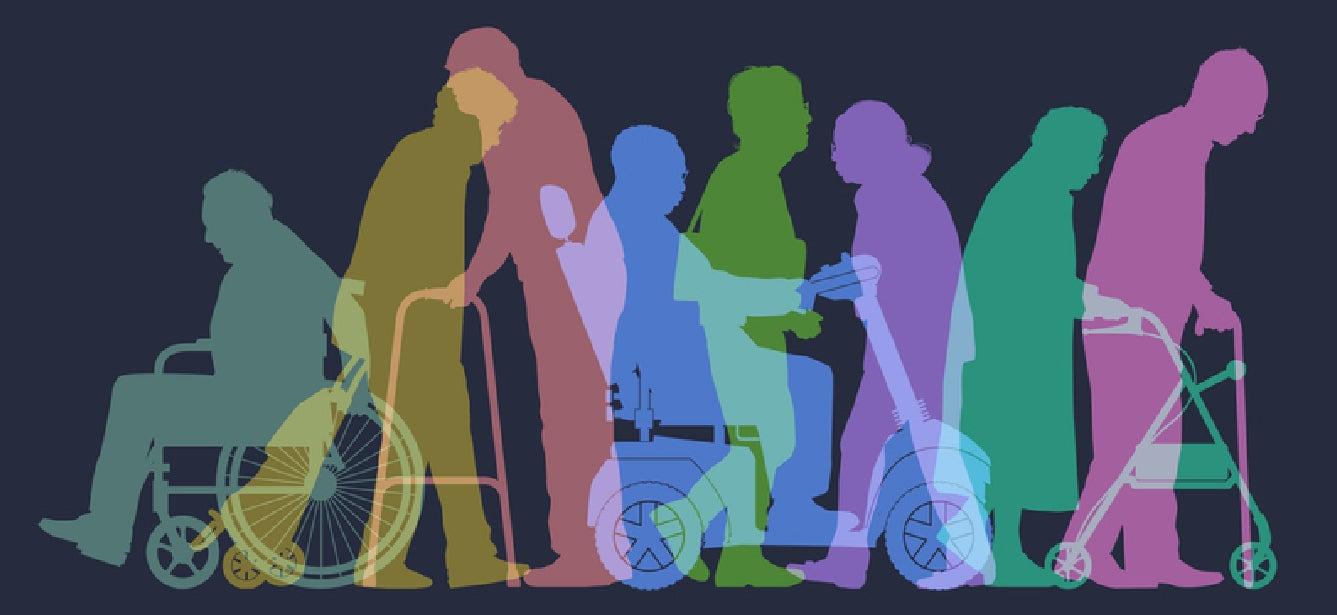
Related Topics
People with Alzheimer’s disease or other types of dementia have unique medical, safety, and social needs. Medicaid helps cover certain memory care costs for eligible older adults who require these services.
Understanding Medicaid and memory care
What is Medicaid?
Medicaid is a joint federal and state health insurance program for people with low income, providing vital coverage for more than 1 in 5 Americans.1 This program plays an important role in increasing health care access. Medicaid should not be confused with Medicare, a federal health insurance program for adults age 65 and older and certain younger people with disabilities.
What is memory care?
Memory care refers to a holistic set of services purposefully tailored to the needs of people with dementia. This type of care is delivered by specially trained staff, with a goal of helping patients safely maintain their independence and a good quality of life.
Memory care can be provided in a variety of settings, including skilled nursing facilities (nursing homes), assisted living communities, continuing care retirement communities, adult day health care centers, and in the patient's own home. There are also some dedicated, standalone memory care facilities.
Services related to memory care may include, but are not limited to:
- 24-hour supervision and nursing care
- Help with activities of daily living
- Medication management
- Social activities
- Memory-stimulating activities
- Physical activities
- Meals and snacks
- Mobility assistance
- Physical, occupational, and speech therapies
Does Medicaid cover memory care expenses?
What Medicaid covers in memory care
Medicaid generally pays 100% of the costs of a nursing home stay, including any memory care services provided in the scope of that care. It does not cover the cost of room and board in assisted living or dedicated memory care facilities. However, Medicaid may pay for some memory care services provided in these settings for eligible patients if the facility is Medicaid-approved.
There are two primary ways Medicaid pays for memory care:
Institutional Medicaid: In all states and Washington, D.C., Medicaid will pay for 100% of nursing home care for eligible adults with Alzheimer's or another type of dementia. This includes the cost of room and board as well as health care services, personal care services, meals, and any memory care services provided at the facility. Only nursing homes licensed and certified as a Medicaid Nursing Facility (NF) can accept Medicaid patients.
Home and Community-Based Services (HCBS): This Medicaid program allows people to receive certain long-term services in their home or in assisted living facilities, memory care facilities, adult day health care centers, and other community settings. HCBS coverage is provided in the form of 1915(c) waivers. Some waivers are reserved for people with dementia or other specific needs. To qualify for an HCBS waiver, you must first apply for Medicaid benefits.
HCBS waivers pay for services such as skilled nursing, help with activities of daily living, medication management, and specialized memory care programs. Housekeeping, transportation, and respite care services may also be covered. Medicaid waivers do not cover the costs of room and board in residential settings. Rather, they can help defray the overall costs of assisted living or a memory care facility.
Unlike Institutional Medicaid, HCBS waivers are not an entitlement. Waiver availability is limited. Even if you are eligible for services, you may be placed on a waitlist if there is no room left in the program. States choose the maximum number of people who can receive services under each waiver program.
State-by-state variations in coverage
Every state Medicaid program has its own unique memory care eligibility guidelines and coverage limitations. Waivers differ quite a bit across states in terms of what they cover and who is eligible. Reach out to your Medicaid office to learn about Medicaid memory care coverage in your state.
Applying for Medicaid to pay for memory care
Assessing your eligibility
The rules governing Medicaid eligibility are complex and vary from state to state. To apply for Medicaid-covered memory care, you must have income and assets that fall below certain limits. These limits change every year and depend on your marital status and the state in which you live. For 2023, the monthly income limit for most states is $2,742 for single individuals with countable assets of $2,000 or less. For married spouses (both applying), the income limit is $5,484 with countable assets of less than $3,000.
Whether you’re applying for nursing home Medicaid or an HCBS waiver, you must also show you require a certain level of care. For example, a Nursing Home Level of Care (NHLOC) assessment helps determine whether you need the level of care delivered in an institutional setting. Level-of-care requirements for waivers may be different than those for nursing home care. States are permitted to create additional criteria—such as age or diagnosis, for example—in order to reserve a waiver for a select population in need.
How to apply for Medicaid
To apply for Medicaid benefits, you must live in the state where you're applying. You can start the application process by contacting your state Medicaid agency. Depending on your state of residence, you may be able to apply in person, by mail, by phone, or online.
Finding certified Medicaid memory care facilities accepting Medicaid near me
Medicaid-certified facilities
Medicaid-certified nursing homes must meet strict government guidelines for quality and safety. Visit Medicare.gov to search for and compare Medicare- and Medicaid-certified nursing homes in your location.
When it comes to assisted living and memory care facilities, not all work with older adults who have Medicaid. In some cases, even if a facility does not accept Medicaid, they may allow independent service providers to come in and provide services to Medicaid-funded residents. To find places near you that accept Medicaid, reach out to your local Area Agency on Aging.
Researching facilities
How do you find the right nursing home or memory care facility for yourself or a family member? An in-person visit is a good idea, whether you do it yourself or have a family member visit on your behalf. Be sure to ask plenty of questions.
Some ideas on what you can ask include:
- Is this facility Medicaid- and/or Medicare-certified?
- Is the building (or memory care unit/floor) secure?
- What types of memory care and other services are available?
- Which types of care are not offered at the facility?
- What varieties of meals are served daily?
- What kinds of activities are provided for residents?
- What specific training does the staff have?
- What are the staffing ratios like?
- Is a background check required for staff members?
Paying for other fees in memory care
Room and board make up a large part of long-term care costs. While Medicaid covers nursing home room and board costs for eligible residents, it will not cover room and board in an assisted living or memory care facility. That’s why it’s important to plan for alternative ways to fund these and other non-covered expenses. Additional options for funding include:
- Private sources: Many people pay for memory care through income, personal savings, pensions, and other types of private funds.
- Veterans’ benefits: Eligible veterans with dementia may be entitled to a range of benefits through the Veterans Administration (VA).
- Long-term care insurance: Long-term care policies may cover some of the costs of memory care. Be sure to thoroughly research your policy and the specific coverage it provides.
- Other programs: Some residential communities work with nonprofit organizations and foundations that help people in need cover the cost of long-term memory care. Also, many states provide an optional state supplement in addition to federal Supplemental Security Income (SSI) payments to help lower the costs of long-term care.
Comparing Medicaid and Medicare in memory care
Medicare covers certain aspects of care required by dementia patients throughout their illness. This includes inpatient hospital stays, cognitive assessments, home safety evaluations, and hospice care. Medicare also pays for up to 100 days of skilled nursing home care in certain situations. In addition, certain prescription medications used to treat dementia fall under Medicare Part D coverage.
Unlike Medicaid, however, Medicare does not cover room and board expenses for nursing homes or any other type of long-term care facility.
Frequently asked questions
How much does Medicaid pay for memory care?
For eligible beneficiaries, Medicaid pays 100% of nursing home costs and any memory care services provided in that setting. Medicaid also provides limited HBCS waivers to help cover the costs of memory care delivered in other types of settings, such as assisted living and adult day health care centers.
What memory care facilities accept Medicaid?
Visit Medicare.gov to search for Medicare- and Medicaid-certified nursing homes in your area. To find assisted living facilities near you that work with older adults on Medicaid, ask your local Area Agency on Aging or talk to directly to the facilities you’re interested in.
How do I find out if I’m eligible for Medicaid?
Reach out to your state’s Medicaid office to ask about Medicaid eligibility guidelines for your state. You can also visit the Health Insurance Marketplace and answer a few questions to see if you qualify based on income.
Know your options before making a decision
When it comes to memory care for people with dementia, Medicaid provides important coverage for those who qualify. The coverage provided depends greatly on the state of residence and type of care community. Speak to your state’s Medicaid agency or a qualified advisor to understand your options and financial responsibilities related to long-term care.
And be sure to visit BenefitsCheckUp to explore benefits programs that can help pay for health care, medicine, food, utilities, and more.
Sources
Robin Rudowitz et. al. 10 Things to Know About Medicaid. Kaiser Family Foundation. June 30, 2023. Found on the internet at https://www.kff.org/mental-health/issue-brief/10-things-to-know-about-medicaid/




